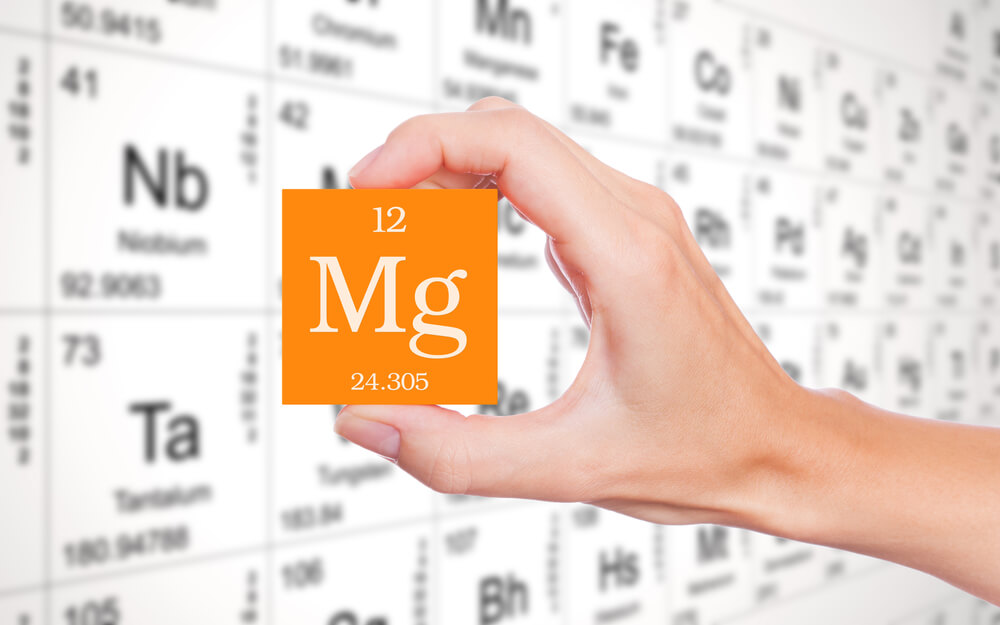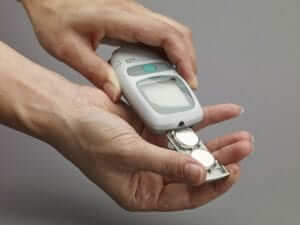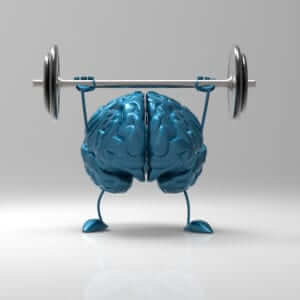The role of magnesium in the body is a vital one. It’s been overlooked in past years as the attention has been on other nutrients like vitamin C, vitamin D, and calcium.
However, research has made quite clear just how important magnesium is for your health. It’s involved in over 600 different enzymatic reactions in your body and is needed for the absorption and utilization of other important nutrients.
A lack of magnesium is linked to conditions like metabolic disease, depression, and insomnia.
Here’s a closer look at what magnesium does, how to tell if you’re deficient, and the top magnesium foods to boost your intake.
What Is Magnesium? And Why You Can’t Function Without It

You can’t live without any of the essential nutrients (which is why they are “essential”), but some experts have made the case that magnesium is the most important mineral for human health.
It’s the fourth most abundant mineral in your body and is involved in almost every bodily process. Important functions like DNA synthesis, insulin metabolism, energy creation, and nervous system regulation can’t happen without magnesium.
Most of the magnesium in your body is concentrated in your bones. The rest is stored in soft tissues, muscles, and blood.
It’s hard to pinpoint just one central role of magnesium, since it’s connected to so much. Some of its most notable contributions include healthy nerve and muscle function, blood sugar control, protein formation, and gene maintenance.
If that weren’t enough, magnesium also helps to regulate other nutrients like calcium, sodium, and potassium. It even plays a part in helping your body metabolize vitamin D, another extremely important nutrient.
This just scratches the surface of what magnesium does, so let’s take a look at some more specific actions it has for your health.
Specific Health Benefits of Magnesium
Can Help You Sleep Better

Research has shown a definite connection between sufficient levels of magnesium and sleep quality. One of the symptoms of a deficiency is trouble falling or staying asleep.
Experts are still exploring how magnesium is connected to sleep, but it appears to have to do with the regulation of melatonin.
Melatonin, often called the sleep hormone, is thought to be the main control of your sleep-wake cycle. It tells your body when you should be awake and when it’s time to sleep. Factors like sunlight and darkness cause your body to produce less or more melatonin, but magnesium also plays a role in melatonin production.
Without enough magnesium, melatonin levels will diminish, likely causing sleep problems.
Another role of magnesium for good quality sleep is its ability to activate your parasympathetic nervous system. This is the system that calms and relaxes you, helping you to fall and stay asleep.
A few studies have shown that magnesium supplementation can combat insomnia, especially in older adults. There’s also evidence that combining it with melatonin and zinc can be very effective as well.
Enhances Mood and Fights Depression
Magnesium is important for healthy brain function, and therefore play a big role in your mood and mental health. In fact, low levels of magnesium have been linked to a 22% greater risk of developing depression.
More research is needed on exactly how magnesium and mood are connected. Nonetheless, several clinical trials have shown positive effects of magnesium supplementation to boost mental health.
In one study conducted with older adults, a magnesium supplement was found to be just as effective as an antidepressant at treating symptoms of depression. Other studies have had similar results, and some have reported a reduction in anxiety symptoms as well.
While the trials so far have been small and limited, it’s clear that getting enough magnesium is critical for a better mood and possibly reduced stress and anxiety.
Helps Regulate Blood Sugar & Type 2 Diabetes

Yet another important role of magnesium is helping to regulate insulin and therefore blood sugar.
Insulin is the hormone that gets sugar (also called glucose) transported from the blood into your tissues. This has a two-fold purpose of getting fuel (the glucose) to a place where it can be used and also keeping blood sugar levels steady.
Without sufficient magnesium, the function of insulin is impaired. This can lead to high blood sugar, insulin resistance, and a greater risk of developing type 2 diabetes.
Because of this, getting more magnesium through food or a supplement has potential benefits for diabetics. One study found that supplementation with magnesium improved blood sugar, HbA1c levels, and insulin sensitivity in participants with type 2 diabetes.
Keep in mind that these improvements are only likely to happen if you are magnesium deficient. Magnesium has shown no effect on blood sugar or insulin in those who already had sufficient levels of the mineral.
May Help Prevent or Relieve Migraines
Migraines are extremely painful and can be debilitating. If you get them frequently, you know how difficult they are to deal with. Nausea and light sensitivity often accompany a throbbing head pain that can last for hours.
Research indicates that low levels of magnesium play a role in migraines. If you are deficient in magnesium, boosting your intake may help reduce the severity and frequency of your headaches.
One study found that migraine sufferers who took a magnesium supplement experienced fewer and less severe attacks than the placebo group. Another trial found that magnesium could be a safe and effective treatment for children who get migraine headaches.
Along with prevention, magnesium may even be able to provide fact-acting relief. This comes from another study that found a magnesium supplement relieved symptoms of migraine more quickly than a common medication.
If you deal with frequent migraines or severe headaches, it’s certainly worth exploring whether magnesium can bring you some relief.
Important for Lowering Chronic Inflammation

Chronic inflammation has really come to the forefront as one of the main causes of serious chronic and age-related diseases. There are many natural ways you can reduce inflammation in your body (like consuming turmeric), but getting enough magnesium is a vital piece of the puzzle.
Research has shown that low levels of magnesium in the blood are associated with higher levels of certain inflammatory markers related to low-grade chronic inflammation.
Interestingly, at least one study also documents that magnesium can act as an antioxidant to protect your cells from free radical damage. This makes getting enough of it even more important as you get older to age healthfully.
Several clinical trials have even documented that magnesium supplementation can lower markers of inflammation. It appears to have the most benefit for older adults, those who are overweight, and those with prediabetes.
Good for Heart Health (and May Lower Blood Pressure)
Lowering chronic inflammation is one role of magnesium for heart health. It also has an important part in regulating blood pressure and keeping it at a healthy level.
Because of this, a magnesium deficiency is associated with a greater chance of developing high blood pressure (hypertension), which in turn is a risk factor for heart disease.
If you have high blood pressure and are magnesium deficient, research indicates that boosting your levels of magnesium may help.
In one study, a magnesium supplement reduced both systolic and diastolic blood pressure in adult participants with hypertension. Other trials have had similar results, although magnesium doesn’t seem to affect blood pressure if it’s already at a normal level.
Protective of Healthy Brain Function

Besides boosting mood and mental health, magnesium also has benefits for the overall health of your brain. It especially seems to have a protective effect on your nervous system and cognitive function.
Specifically, research has found that magnesium is used in your body to prevent neuronal cells from being overstimulated, which can lead to cell death.
This not only helps to keep brain cells healthy and functioning, it may also provide some protection against neurological diseases like Alzheimer’s and possibly epilepsy.
More research is needed in this area to determine whether magnesium could be a potential treatment for cognitive disorders, but its essential role in maintaining brain health is clear.
May Boost Athletic Performance
Magnesium probably isn’t the first supplement you think of when it comes to exercise or athletics, but it may be able to boost physical performance.
Several studies have shown that taking magnesium can help both athletes and non-athletes when it comes to exercise.
One trial found that a 4-week supplementation period improved the performance of competitive triathletes. There was a noticeable decrease in all their times: swimming, running, and cycling.
Another completely different study examined the effect of a magnesium supplement on healthy elderly women. The results showed better physical performance during exercise.
The reason for these findings is likely connected to the fact that magnesium plays a role in both healthy muscle function and energy production. Your body uses up more magnesium when you exercise compared to when you are resting.
For this reason, it may give you a boost during physical activity and lessen fatigue.
Helps Relieve PMS Symptoms

Premenstrual syndrome (PMS) is the bane of somewhere around 75% of women who are child-bearing age. Major symptoms include cramps, bloating, mood swings, appetite changes, and fatigue.
A few older studies have documented that magnesium supplementation can help with several PMS symptoms, including water retention (bloating) and mood changes.
More recent research has confirmed this and has also documented that a combination of magnesium and vitamin B6 can be even more effective at relieving symptoms of PMS.
The reason for this is still unknown, but it just goes to show how vital magnesium is for all aspects of health.
Magnesium Deficiency: Why It Happens, Signs, & Symptoms
Given the importance of magnesium for your health, being deficient can cause a whole host of problems.
Magnesium is present in quite a few foods, so you would think that deficiency is rare. Severe deficiencies are indeed rare, but milder deficiencies, often called an “inadequacy”, are unfortunately much more common.
Estimates vary slightly from year to year, but research shows that about half of the U.S. population doesn’t get enough magnesium. The numbers are similar in Europe.
What’s to blame for this widespread deficiency?
One factor is certainly diet. The best sources of magnesium include vegetables, nuts, seeds, whole grains, and other whole plant foods. Because the common western diet involves a lot of processed food that’s low in nutrients, many people are simply not eating a mineral-rich diet.
Another serious problem is soil depletion. Plants take up nutrients, including magnesium, from the soil. Conventional farming methods that strip the soil have seriously depleted the supply of minerals normally found there. This means that even good plant foods may be lower in magnesium than they should be.
How do you know if you’re magnesium deficient?
A blood test is one way to find out if you have a magnesium deficiency or inadequacy, but it’s not always reliable. Only about 1% of the magnesium in your body is found in your blood, so it’s difficult to get the whole picture from a blood sample.
There are also several signs and symptoms of magnesium deficiency to look for. Here are the most common ones.
Leg and Other Muscle Cramps

Magnesium plays a big role in your muscles properly contracting. A deficiency can lead to muscle cramps, spasms, and pain. Restless leg syndrome is also often linked to magnesium inadequacy.
Potassium is another important mineral for muscle health, so make sure you are getting enough of that, too.
Fatigue
Magnesium is involved in energy production. Not getting enough of it can lead to general fatigue, low energy, and even weakness. There’s also some evidence that chronic fatigue syndrome is linked to low magnesium levels.
Insomnia and Mood Disorders
Because your body needs magnesium for healthy brain function and melatonin production, sleep and mood disorders are possible signs of deficiency. This includes depression and anxiety.
Osteoporosis
Interestingly, a magnesium deficiency as well as a calcium deficiency can be the main factor in osteoporosis. This is because magnesium is needed in order for your body to utilize calcium for bone strength. If you know you are getting enough calcium and vitamin D, yet still have weakened bones, a lack of magnesium may be the cause.
Other Symptoms

Other potential symptoms of magnesium deficiency include high blood pressure, type 2 diabetes, asthma, and migraines.
These health conditions can have multiple causes and risk factors, so it’s more difficult to know whether they come from a lack of magnesium or something else.
Most At-Risk Groups
Besides getting a blood test and looking for signs of a deficiency, there are four major groups that are more at-risk for not getting enough magnesium. These include: older adults, people with a gastrointestinal disorder, people with type 2 diabetes, and people with alcohol dependence.
If you belong to one of these groups, magnesium inadequacy is much more likely to be a problem.
Top Magnesium-Rich Foods to Boost Your Intake

Now that you know the important role of magnesium for your health, how do you make sure you’re getting enough of it?
The best place to start is by regularly eating magnesium-rich foods. Choose sustainable and organic, or an equivalent, when possible to support farming practices that don’t deplete the soil.
To give you a goal to aim for, most experts recommend a daily intake of 400-420 mg for men and 310-320 mg for women.
Here are the top food choices:
- Spinach (157 mg. per cup- 40% DV)
- Pumpkin Seeds (184 mg. per 1/4 cup- 46% DV)
- Swiss Chard (154 mg. per cup- 38% DV)
- Dark Chocolate (64 mg. per ounce- 16% DV)
- Black Beans (120 mg. per cup- 30% DV)
- Cashews (83 mg. per ounce- 20% DV)
- Almonds (80 mg. per ounce- 20% DV)
- Avocados (58 mg. per medium avocado- 15% DV)
- Cooked Quinoa (118 mg. per cup- 30% DV)
- Buckwheat (65 mg. per ounce- 16% DV)
- Halibut (90 mg. per 3 ounces- 23% DV)
- Figs (50 mg. per 1/2 cup- 13% DV)
- Bananas (32 mg. per medium banana- 8% DV)
- Flax Seeds (110 mg. per ounce- 27% DV)
- Chia Seeds (95 mg. per ounce- 23% DV)
Magnesium: Essential for Health
There is no getting around the importance of magnesium. It hasn’t received as much attention or research as other nutrients, but the essential role of magnesium in the body is rapidly becoming clearer and clearer.
You need magnesium for quality sleep, mental health, heart health, energy, and much more.
An inadequacy can cause some serious problems but usually isn’t difficult to fix. A good variety of foods provide us with magnesium, so with a little effort, you can make sure you are getting your daily intake of this vital mineral!



Thank you. Very interesting article. Lots of important information!!
Thank you for all the important information you send! I find it very helpful!
I love your Dad jokes!
Mary
Thank you for this article. Very helpful. Evelyne Laurin
Best dad joke is horse next door. Thanks for the good Mg info.
Great article! I love the Dad jokes, too! Keep ’em coming!
I am very prone to what I call “muscle seizures” in my legs – the muscles affected vary from time to time. However, When I notice very tight muscles, I use the magnesium oil spray and ingest a small amount (1/4 t or less) of potassium “NoSalt” with 8+ oz of water before I go to bed. If I end up having the cramp anyway, I do more of the same. Glad to know that my home remedy really does have science backup.
where do you get the magnesium oilspray
I always love your articles, they are clear and exact with reliable information. Thank you for being you.
If you’re like myself, magnesium can give you diarrhea. I now do transdermal magnesium and it’s great! Takes a few months to build up in your system, but its working! Also magnesium salt baths are wonderful for sleep and relaxation.
GOOD JOB ! I apparently do have enough mag ! Those are all the foods that are in my diet regularly .That was not always the case though, So thank you
Thank you for all your help & information .
Thankyou for the information; very helpful. I also like your Dad jokes!
Wonderful article, thank you! You said having a blood test to determine Magnesium deficiency or inadequacy is not always reliable (or adequate). What are the other ways to determine these issues?
Compare magnesium oxide, magnesium transdermal, magnesium citrate. How can I determine which one I need. I think I have Hyperoxaluria inherit disorder, intestinal disease and functional constipation; Dyslisis, imbalance in the composition of microbiota; and or histamine intolerance. What can I do?
I was just thinking the other day – “what is the best & most absorbable magnesium”? Many thanks for answering my question. 🙂
Great article! I just watched a cardiovascular docu-class in which several of the doctors mentioned that magnesium is very important for great cardiovascular health. I’m sure they would agree with this article completely! Thanks also for the Dad jokes!
Great article! Very informative; and the great Dad jokes, awesome!
Great info!Thank you!
I don’t know if this qualifies as a dad joke, but it made me laugh today:
Someone asked a young boy what he would do if his clothes were on fire. He thought a moment, then replied, “I wouldn’t put them on.”
Smart boy!
I got spasmofilia during a period off overwork; not enough sleep; not enough healty food.. too much sugar. I use a combination off herbs & take care off my diet (as I did before the period off overwork) + take good absordable minaral/vitamin combination. When I get spasm/cramp… I add extra Magnesium & look again what is wrong in my diet & my stress level. It was good to get this overview off all symptoms due to lack off Magenesium
Thanks Brian!
Very informative, I know I now need to get tested!
One thing I know for sure. I have less external inflammation to deal since I’ve added more magnesium to my diet. I have less muscle aches, pains and stiffness to deal with too. I recommended magnesium to a friend who had been dealing with constant migraine headaches for over 5 years. I asked her about 2 weeks later if the magnesium helped her. She told me that the headaches were gone! I have no idea of the type of magnesium she’d taken. But it worked for her.
Thank you for a very informative artical. Education about our bodys needs and biology is sadly lacking in school corriculums and it is so important
Thanks brian. I have watched your shows, last year as well as this year. I bought the series last year. very informative.
my sister who past away last week . after 20 minutes on dialysis machine she coded , she was dead before the ambulance brought her to the hospital. her doctor always stated her magnesium level was too high- how could that be if a blood test is really unreliable?
thanks for all your excellent info. But I do not like the dad jokes–sorry.
what about magnesium oxide 500mg? I am sharing your info w/a friend who has been taking sleeping pills for years.
Thanks Brian for the information about magnesium. I found I can get magnesium from certain foods. Thanks for the information. Now I need to run it by my neurologist. Thanks for your email you sent to me several weeks weeks ago. I hope all is well with you.
Darby Ringer
This artice was amazing.Even though I read alot or listen to talks on this stuff. I had learnt a lot in terms of the importance of magnesium for your heart brain bones maintainence of your sugar levels and your general health. Very informative.
Thank you Brian, the article has been very informative as I suffer with Fibromyalgia, IBS and bad headaches. I will have to let my daughter have a read as well.
Keep the dad jokes rolling, they are silly but fun and make you laugh.
I do save all sweet Brain emails Bless You